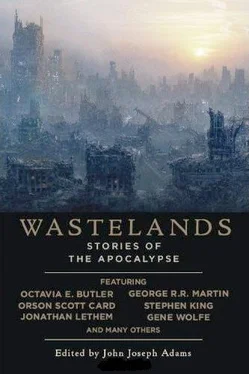No "ummm" at all.
The air-conditioning cycled off. For the first time Wyndham noticed a strange smell-a faint, organic funk, like spoiled milk, or unwashed feet.
Standing there in the dark, Wyndham began to have a very bad feeling. It was a different kind of bad feeling than the one he’d had in Monica’s living room watching airliners plunge again and again into the World Trade Centre. That had been a powerful but largely impersonal bad feeling-I say "largely impersonal" because Wyndham had a third cousin who worked at Cantor Fitzgerald. (The cousin’s name was Chris; Wyndham had to look it up in his address book every year when he sent out cards celebrating the birth of his personal savoir.) The bad feeling he began to have when his wife failed to say "ummm," on the other hand, was powerful and personal.
Concerned, Wyndham reached down and touched his wife’s face. It was like touching a woman made of wax, lifeless and cool, and it was at that moment-that moment precisely-that Wyndham realized the world had come to an end.
Everything after that was just details.
#
Beyond the mad scientists and corrupt bureaucrats, characters in end-of-the-world stories typically come in one of three varieties.
The first is the rugged individualist. You know the type: self-reliant, iconoclastic loners who know how to use firearms and deliver babies. By story’s end, they’re well on their way to Re-Establishing Western Civilization, though they’re usually smart enough not to return to the Bad Old Ways.
The second variety is the post-apocalyptic bandit. These characters often come in gangs, and they face off against the rugged survivor types. If you happen to prefer cinematic incarnations of the end-of-the-world tale, you can usually recognize them by their penchant for bondage gear, punked-out haircuts, and customized vehicles. Unlike the rugged survivors, the post-apocalyptic bandits embrace the Bad Old Ways-though they’re not displeased by the expanded opportunities to rape and pillage.
The third type of character—also pretty common, though a good deal less so than the other two—is the world-weary sophisticate. Like Wyndham, such characters drink too much; unlike Wyndham, they suffer badly from ennui. Wyndham suffers too, of course, but whatever he suffers from, you can bet it’s not ennui.
#
We were discussing details, though:
Wyndham did the things people do when they discover a loved one dead. He picked up the phone and dialled 9-1-1. There seemed to be something wrong with the line, however; no one picked up on the other end. Wyndham took a deep breath, went into the kitchen, and tried the extension. Once again he had no success.
The reason, of course, was that, this being the end of the world, all the people who were supposed to answer the phones were dead. Imagine them being swept away by a tidal wave if that helps-which is exactly what happened to more than 3000 people during a storm in Pakistan in 1960. (Not that this is literally what happened to the operators who would have taken Wyndham’s 9-1-1 call, you understand; but more about what really happened to them later—the important thing is that one moment they had been alive; the next they were dead. Like Wyndham’s wife.)
Wyndham gave up on the phone.
He went back into the bedroom. He performed a fumbling version of mouth-to-mouth resuscitation on his wife for fifteen minutes or so, and then he gave that up, too. He walked into his daughter’s bedroom (she was twelve and her name was Ellen). He found her lying on her back, her mouth slightly agape. He reached down to shake her-he was going to tell her that something terrible had happened; that her mother had died-but he found that something terrible had happened to her as well. The same terrible thing, in fact.
Wyndham panicked.
He raced outside, where the first hint of red had begun to bleed up over the horizon. His neighbour’s automatic irrigation system was on, the heads whickering in the silence, and as he sprinted across the lawn, Wyndham felt the spray, like a cool hand against his face. Then, chilled, he was standing on his neighbour’s stoop. Hammering the door with both fists. Screaming.
After a time-he didn’t know how long-a dreadful calm settled over him. There was no sound but the sound of the sprinklers, throwing glittering arcs of spray into the halo of the street light on the corner.
He had a vision, then. It was as close as he had ever come to a moment of genuine prescience. In the vision, he saw the suburban houses stretching away in silence before him. He saw the silent bedrooms. In them, curled beneath the sheets, he saw a legion of sleepers, also silent, who would never again wake up.
Wyndham swallowed.
Then he did something he could not have imagined doing even twenty minutes ago. He bent over, fished the key from its hiding place between the bricks, and let himself inside his neighbour’s house.
The neighbour’s cat slipped past him, mewing querulously. Wyndham had already reached down to retrieve it when he noticed the smell-that unpleasant, faintly organic funk. Not spoiled milk, either. And not feet. Something worse: soiled diapers, or a clogged toilet.
Wyndham straightened, the cat forgotten.
"Herm?" he called. "Robin?"
No answer.
Inside, Wyndham picked up the phone, and dialled 9-1-1. He listened to it ring for a long time; then, without bothering to turn it off, Wyndham dropped the phone to the floor. He made his way through the silent house, snapping on lights. At the door to the master bedroom, he hesitated. The door-it was unmistakable now, a mingled stench of urine and faeces, of all the body’s muscles relaxing at once-was stronger here. When he spoke again, whispering really—
"Herm? Robin?"
—he no longer expected an answer.
Wyndham turned on the light. Robin and Herm were shapes in the bed, unmoving. Stepping closer, Wyndham stared down at them. A fleeting series of images cascaded through his mind, images of Herm and Robin working the grill at the neighbourhood block party or puttering in their vegetable garden. They’d had a knack for tomatoes, Robin and Herm. Wyndham’s wife had always loved their tomatoes.
Something caught in Wyndham’s throat. He went away for a while then. The world just greyed out on him.
When he came back, Wyndham found himself in the living room, standing in front of Robin and Herm’s television. He turned it on and cycled through the channels, but there was nothing on. Literally nothing. Snow, that’s all. Seventy-five channels of snow. The end of the world had always been televised in Wyndham’s experience. The fact that it wasn’t being televised now suggested that it really was the end of the world.
This is not to suggest that television validates human experience-of the end of the world or indeed of anything else, for that matter.
You could ask the people of Pompeii, if most of them hadn’t died in a volcano eruption in 79 AD, nearly two millennia before television. When Vesuvius erupted, sending lava thundering down the mountainside at four miles a minute, some 16,000 people perished. By some freakish geological quirk, some of them-their shells, anyway-were preserved, frozen inside casts of volcanic ash. Their arms outstretched in pleas for mercy, their faces frozen in horror.
For a fee, you can visit them today.
#
Here’s one of my favourite end-of-the-world scenarios by the way: Carnivorous plants.
#
Wyndham got in his car and went looking for assistance-a functioning telephone or television, a helpful passer-by. He found instead more non-functioning telephones and televisions. And, of course, more non-functioning people: lots of those, though he had to look harder for them than you might have expected. They weren’t scattered in the streets, or dead at the wheels of their cars in a massive traffic jam-though Wyndham supposed that might have been the case somewhere in Europe, where the catastrophe-whatever it was-had fallen square in the middle of the morning rush.
Читать дальше












